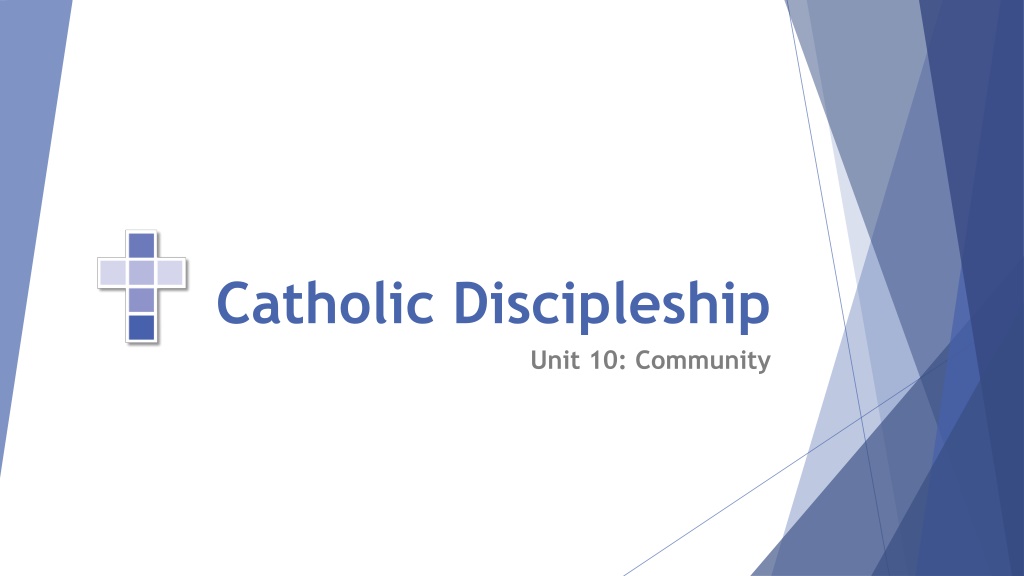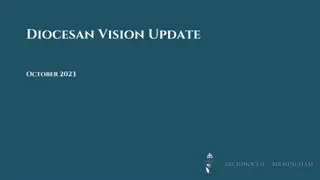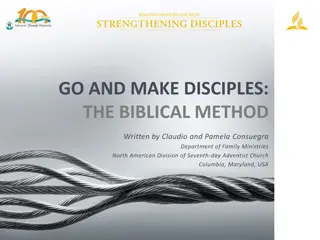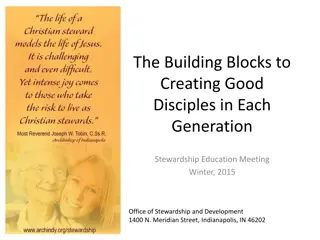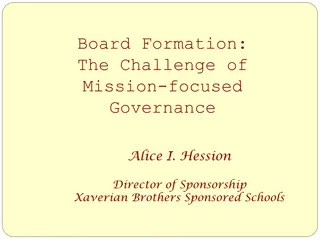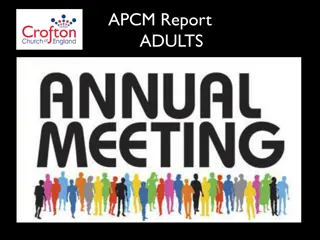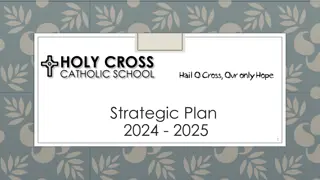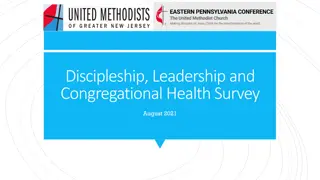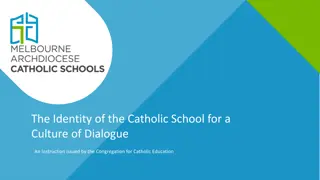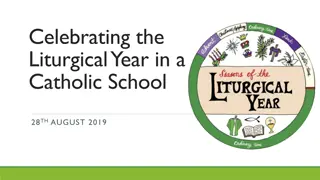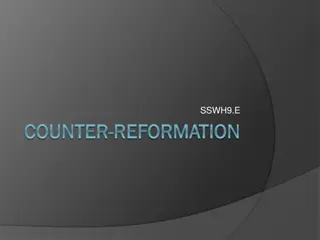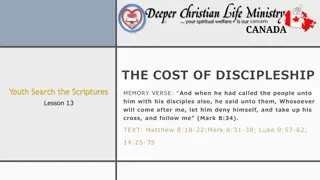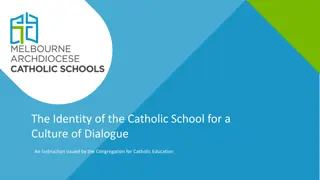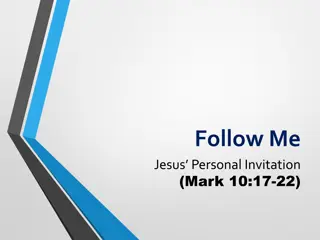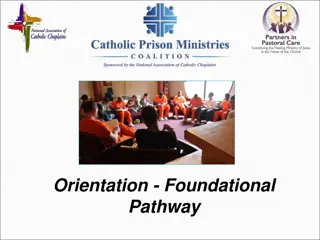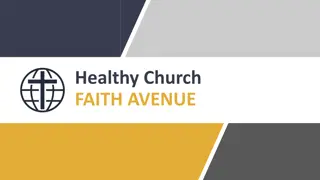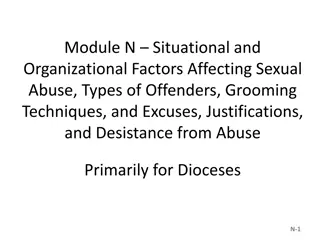Exploring Community in Catholic Discipleship Unit 10
The unit delves into the significance of community in Christian life, the challenges faced by early Christian communities, and the importance of parish life. It explores the themes of faith, covenant, and community in the context of Baptism and Marriage, providing insights on the essence of discipleship within a supportive community environment.
Download Presentation

Please find below an Image/Link to download the presentation.
The content on the website is provided AS IS for your information and personal use only. It may not be sold, licensed, or shared on other websites without obtaining consent from the author. Download presentation by click this link. If you encounter any issues during the download, it is possible that the publisher has removed the file from their server.
E N D
Presentation Transcript
Catholic Discipleship Unit 10: Community
Opening Prayer O Holy Spirit of God, take me as your disciple. Guide me, illuminate me, sanctify me. Bind my hands that they may do no evil. Cover my eyes that they may see it no more. Sanctify my heart, that evil may not dwell within me. Be my guard. Be my guide. Wherever you lead me, I will go. Whatever you forbid me, I will renounce. Whatever you command me, in your strength I will do. Lead me, then, to the fullness of your truth. Amen. - Henry Edward Cardinal Manning, 1809-1892
Orientation The twelve units of Catholic Discipleship are helping us explore dimensions of what it means to be a missionary disciple in the Church today. We are down to our last 3 units. Congratulations! Each unit has an essay section, a spiritual exercise section, and a Scripture passage with reflection questions. Please read the essay section before each meeting. We will do the spiritual exercises together. We will use the Scripture as part of our prayer.
Objectives To see the place of community in Christian life To explore the importance of the Church To think about our parishes as communities that live and express faith; to think about the implications of parish closings, mergings, and twinnings To look at some contemporary distortions about the idea of faith and community To see Baptism and Marriage as expressions of covenant and community
Community in the New Testament We have heard the phrase See how these Christians love one another, but the New Testament details many conflicts in the earliest followers of Jesus. For example: The Corinthians were divided into factions, and people dismissed each other as not wise enough or not spiritual enough. The First Letter of John shows a community that realizes that a part of its members have left as a group. The Galatians were giving up Paul s message and resorting to Jewish ways even though they weren t Jewish. People were saying they contributed everything but they held things back.
Community So, the interactions we see among the earliest Christians give plenty of evidence of just how complicated church life can be. Yet the truth is this: all of us need community. Discipleship cannot grow apart from community. In community, we find ourselves accepted and supported. In community, we also find out if we are truly committed by our faithfulness to others. Through community we receive the vision of hope that we need to persevere as disciples. Indeed, we are not alone in our journey in God s life (p. 69). What has the community of the Church brought to your life?
Heresies of Popular American Religion I go to Church because it blesses me. This is called the prosperity gospel in which preachers claim that going to Church will improve our lives materially, because God will bestow blessings upon us finances, relationships, house and car, etc. This totally ignores the poverty of Jesus, who calls us to be poor and serve the poor. I don t need church. This is the illusion that somehow I can come to a relationship with Jesus, and sustain that relationship, without the support of others. In fact, all faith comes, one way or another, through community.
Consolidating, Merging, Closing Parishes What experiences have you had of parishes being merged, consolidated, or closed? What were the feelings of people and where did these feelings come from? In what ways do you think parishes can be clannish? Even today when we do not organize parishes very often around ethnicity? In what ways do we see our parish open to new people? How do we invite, engage, and welcome new people into our parish? How can we do this better today?
Who Is My Neighbor? P. 71 reminds us of the parable of the Good Samaritan. The Samaritan was the one despised by broader society, yet the Samaritan stops to help. The teachings of Jesus have blossomed into the social teaching of the Church which took on new power in the 1800s under the influence of the Labor movement. These teachings include: the inherent dignity of everyone; the preferential option for the poor; striving for peace, service, and compassion; global connectedness with all (solidarity); and working for justice in the world.
Covenant Expressed in Baptism We who are baptized, then, form a special community rooted in the life and ministry of Jesus. When Jesus bestows his Spirit upon the baptized, he gives us the ability to continue his ministry of serving God by bringing about the Kingdom. The community of the baptized, the Church, becomes the nucleus of this Kingdom a center of grace so powerful that it extends beyond the visible borders of the Church, in mysterious ways, into all human experience (p. 72). In what way is the Church the sacrament of the Kingdom, showing the world a vision of how we can live?
Covenant Expressed in Marriage Marriage forms family, the nucleus of community. Family life forms the essential ways of acting and feeling that shape the personalities of people. Marriage leads people to love each other with the faithfulness of Jesus, thereby modeling his love as a way of life. Marriage is a special example of unconditional, selfless love a major factor that can shape the world. Marriage underscores the place of family in the lives of everyone.
Covenant and Mission Catholics can model the way humankind can be one by the way we bring about unity in the multicultural reality of our church experience. We can credibly be involved in ecumenical and interfaith experiences because our Catholic life so often invites us to be open to the other, the strangers who constantly find a home in our midst. We can model what acceptance looks like, as well as the richness that comes from reaching out to those who, at first glance, appear strange, because of the stronger community that results (p. 75).
Spiritual Exercise (p. 76) Make a list of the communities in your life that are important to you, starting with your family. Write a sentence or two about the way this community has contributed to your life, what it has brought to you. Indicate how your experience in this community has deepened your personal life and your sense of God.
Conclusion Thank you for coming and participating. Please think of bringing a friend along next week. You may bring your Bible next week, although we will be focusing on other themes of discipleship, such as service. We invite you to spend some time in hospitality after our session. Please stand and recite together the Catholic Discipleship prayer and the Lord s Prayer.
Catholic Discipleship Prayer Lord, God, through our baptisms you have made us disciples, followers of Jesus who attend to his Word, pray and worship in his Spirit, experience love in his community of the Church, and are sent to serve by helping others as he did. Lead us, Father, more fully into your Kingdom, which Jesus came to begin and fulfill. Help us, through his Spirit, to adhere to him and bring his Good News to all we encounter. We pray this in his name. Amen. Our Father...
